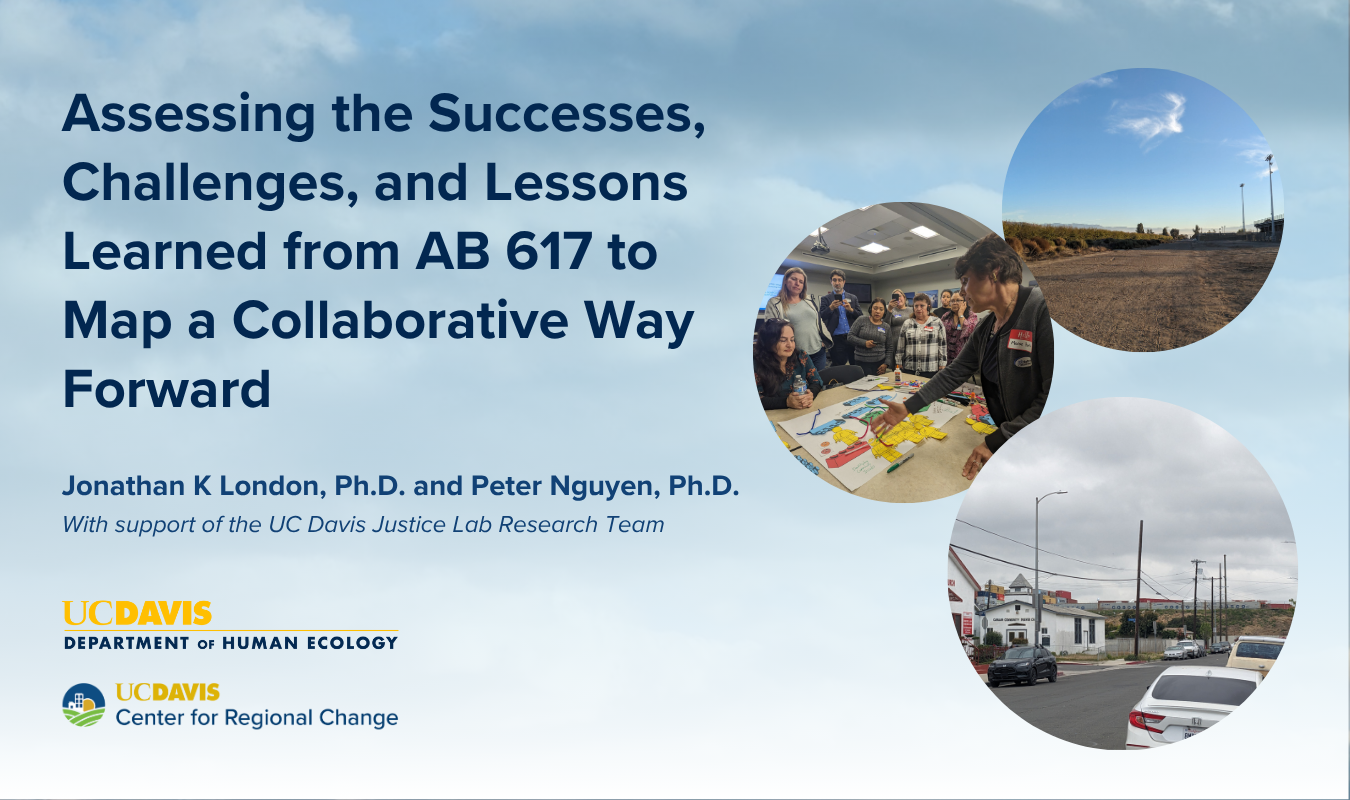
Assessing the Implementation of California’s Clean Air and Environmental Justice Strategies (AB 617)
This study examines the implementation of California's Assembly Bill 617 (AB 617) across seven communities of the 19 funded sites from 2020 to 2024. It focuses on how this innovative policy has begun to transform air quality governance in disadvantaged communities. Using a mixed-methods approach combining participant observation of 264 public meetings, 110 stakeholder interviews, and extensive document analysis, the research assesses both the procedural goal of increasing community power in decision-making and the substantive goal of improving local air quality.
Key findings reveal significant progress in community inclusion and authority in air quality decisions, as measured through a novel "community power mapping" framework. The first set of communities showed improved levels of community power between 2020 and 2024, though with considerable variation across sites. The study also identifies the emergence of complex "implementation ecosystems" - networks of relationships between community members, government agencies, and industries that both support and sometimes impede policy implementation.
While AB 617 has achieved important successes in transforming community-agency relationships and advancing environmental justice principles, challenges remain in securing sustainable funding, ensuring implementation that reflects community voice and expanding the program's reach. These findings offer crucial insights for improving AB 617's implementation and informing similar environmental justice policies nationwide. The study recommends sustaining and expanding funding for policy implementation, improving accountability of the state and regional air districts to community concerns and priorities, enhancing coordination across the implementation ecosystem, and supporting community leadership.
Interested in further exploring? The following documents cover the depth of the project. Full access found below:
- Community Briefs (English)
- Richmond/North Richmond/San Pablo
- Stockton
- Wilmington/Carson West/Long Beach
- Shafter
- Arvin/Lamont
- Portside
- South Central Fresno
- Community Briefs (Spanish)
- Richmond/North Richmond/San Pablo
- Stockton
- Wilmington/Carson West/Long Beach
- Shafter
- Arvin/Lamont
- Portside
- South Central Fresno
News Stories
Kerry Klein. 2020. Ambitious Air Improvement Program Brought Community To The Table - Here's How It's Working So Far. KVPR. https://www.kvpr.org/health/2020-02-22/ambitious-air-improvement-program-brought-community-to-the-table-heres-how-its-working-so-far February 22, 2020.
Rachel Becker. 2022. Has California’s landmark law cleaned communities’ dirty air? Cal Matters. https://calmatters.org/environment/2022/01/california-air-quality-environmental-justice-law/ January 31, 2022.
Tiffany Dobbyn. 2025. CA Clean Air Law Making Strides in Overburdened Neighborhoods. UC Davis College of Agricultural and Environmental Sciences. https://www.ucdavis.edu/climate/news/ca-clean-air-law-making-strides-overburdened-neighborhoods. June 12, 2025
Guy Marzorati. 2025. California’s Clean-Air Program for Polluted Communities Faces Crossroads. KQED. https://www.kqed.org/news/12050096/californias-clean-air-program-for-polluted-communities-faces-crossroads. August 11, 2025
Academic Publications
MacIver, L., London, J., Sampson, N., Gordon, M., Grow, R., & Eady, V. (2022). West Oakland’s experience in building community power to confront environmental injustice through California’s Assembly Bill 617. American Journal of Public Health, 112(2), 262-270.
ACKNOWLEDGEMENTS
This study is grounded in an honoring of land, labor, and knowledge. We acknowledge the historical and on-going roles of colonialism, structural racism, and exploitation of immigrant and domestic labor that have left scars on the land and on the bodies of those who work and depend on it. We also acknowledge and thank Indigenous Californians and more recent allies for their generations of stewardship of the land, water, and air. Lastly, we must acknowledge the diversity of knowledge incorporated in this study. This work didn't start with us: we have ancestors, elders, engaged scholars, and activists with unique and valuable knowledge on whose shoulders we stand. Please take a moment to acknowledge your mentors, ancestors, elders, activists, and scholars who have supported you in your learning and work for racial, social and environmental justice. (We express gratitude for Marisol Cantu for encouraging us to include this land, labor, and knowledge acknowledgement.)
We sincerely thank the members of our AB 617 Study Advisory Committee for their crucial guidance and partnership on our study design and deliverables. Advisory Committee Members include: John Balmes (CARB), Deldi Reyes (CARB), Jessica Olsen and Stephanie Ng (SJVAPCD), Gustavo Aguirre Jr. and César Aguirre (CCEJN), Suma Peesapati and Diana Ruiz (BAAQMD), Ms. Margaret Gordon (WOEIP), Marisol Cantu (Safe Return Project & Richmond/ North Richmond/ San Pablo CSC), Anissa Heard-Johnson and Walter Shen (South Coast AQMD), Theral Golden (Wilmington/ Carson/ West Long Beach CSC), Domingo Vigil and Shalem Aboody-Lopez (SDAPCD) and John Alvarado (Portside EJ Communities CSC).
We also express deep gratitude for our community partners including Nayamin Martinez and staff from the Central California Environmental Justice Network (CCEJN) in the San Joaquin Valley focus of the study.
We thank our UC Davis undergraduate research teams with the UC Davis Justice Lab for their excellent research support. We also want to thank Audrey Jacobs for their exceptional work in designing the study's reports and graphics.
This study was generously funded by the Robert Wood Johnson Foundation, through an Interdisciplinary Research Leaders fellowship, The California Wellness Foundation, and UC Agriculture and Natural Resources.
DISCLAIMERS
The opinions expressed in this article are solely those of the authors and do not represent the official position or policy of its funders or Advisory Committee members. The mention of trade names, products, and organizations does not constitute endorsement or recommendation for use.
PREFERRED CITATION
London, Jonathan K, Nguyen, Peter and the UC Davis Justice Lab. (2025). Assessing the Successes and Challenges, and Lessons Learned from AB 617 to Chart a Collaborative Way Forward. UC Davis Center for Regional Change/ Department of Human Ecology.
